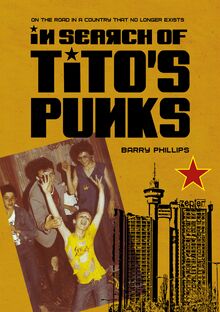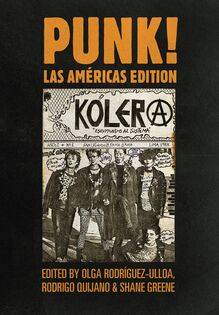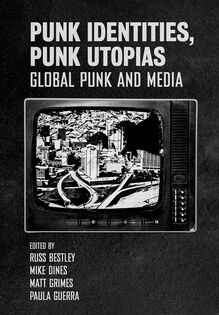-
 Univers
Univers
-
 Ebooks
Ebooks
-
 Livres audio
Livres audio
-
 Presse
Presse
-
 Podcasts
Podcasts
-
 BD
BD
-
 Documents
Documents
-
- Cours
- Révisions
- Ressources pédagogiques
- Sciences de l’éducation
- Manuels scolaires
- Langues
- Travaux de classe
- Annales de BEP
- Etudes supérieures
- Maternelle et primaire
- Fiches de lecture
- Orientation scolaire
- Méthodologie
- Corrigés de devoir
- Annales d’examens et concours
- Annales du bac
- Annales du brevet
- Rapports de stage
La lecture à portée de main
Vous pourrez modifier la taille du texte de cet ouvrage
Découvre YouScribe en t'inscrivant gratuitement
Je m'inscrisDécouvre YouScribe en t'inscrivant gratuitement
Je m'inscrisEn savoir plus
Vous pourrez modifier la taille du texte de cet ouvrage
En savoir plus

Description
Punk Identities, Punk Utopias: Global Punk and Media seeks to unpack and illuminate punk as a trajectory of ‘timelesness…as a set of diverse but confluent values and appropriations’ that have both reflected and informed an increasingly complex, indefinable social, political and economic setting. Whereas the first two volumes in the series were broadly focused on local punk ‘scenes’ in a disparate range of countries and regions around the world, Punk Identities, Punk Utopias extends that critical enquiry to reflect broader social, political and technological concerns impacting punk scenes around the world, from digital technology and new media to gender, ethnicity, identity and representation. This new volume therefore draws upon the interdisciplinary areas of cultural studies, musicology and social sciences to present an edited text on the notion of identities, ideologies and cultural discourse surrounding contemporary global punk scenes. It is hoped that the books in the Global Punk series will add to the academic discussion of contemporary popular culture, particularly in relation to punk and the critical understanding of transnational and cross-cultural dialogue.
Punk is a global phenomenon and the Global Punk series aims to reflect contemporary scenes around the world since the millennium. Punk and its subsequent variants, from hardcore to post-punk, have always crossed borders and become assimilated within countercultural practices with local, national and regional variations.
Produced in collaboration between the Punk Scholars Network and Intellect Books, the Global Punk book series focuses on the development of contemporary global punk (c. 2000 onwards), reflecting upon its origins, aesthetics, identity, legacy, membership and circulation. Critical approaches draw upon the interdisciplinary areas of (among others) cultural studies, art and design, sociology, musicology and social sciences in order to develop a broad and inclusive picture of punk and punk-inspired subcultural developments around the globe. The series adopts an essentially analytical perspective, raising questions about the dissemination of punk scenes and subcultures and their form, structure and contemporary cultural significance in the daily lives of an increasing number of people around the world.
This book has a genuine crossover appealed. It will be a key resource for established academics, postdoctoral researchers and Ph.D. students, as well as being suitable for adoption as an undergraduate student textbook. Suitable courses will include those in the fields of popular music, youth culture, sociology, urban/cultural geography, political history, heritage studies, media and cultural studies.
Introduction
Russ Bestley, Mike Dines, Matt Grimes and Paula Guerra
- From Belfast with love: The women and female presenting punks of Northern Ireland and
their ‘subculture’
Francis Stewart
- The power of memory: Gender inequality among the Berlin psychobilly scene
Matthew D. Newsom
- Trans-Punk: DIY identities and new modes of subjectivity
Gareth Schott
- Brazilian riot grrrls: History, reflections and feminist empowerment in girls
rock camps
Gabriela Cleveston Gelain and Mike Dines
- Not just Riot Grrrls! Punk rock feminism in the Philippines
Monica Schoop
6. Not just boys’ fun: Punks, pariah femininities, and challenges to gender hegemony
Steve Moog
- Say a spell: Summoning the ghosts of post-punk Melbourne
Donna McRae and Alexia Kannas
- Keeping Japanese punk film (A)LIVE: Shôzin Fukui’s concert-screening hybridity and
Japanese live house culture
Mark Player
- ‘Back from the Grave’: Retro style and cultural memory in the Tokyo garage rock scene
José Neglia
- The punks, the web, local concerns and global appeal: Cultural hybridity in Turkish
hardcore punk
Lyndon C. S. Way and Dylan Wallace
- Love at first sip? When Finnish hardcore punk met alcohol
Lasse Ullvén
- Punk is punk but by no means punk: Definition, genre evasion and the quest for an
authentic voice in contemporary Russia
Yngvar Bordewich Steinholt
Sujets
Informations
| Publié par | Intellect Books |
| Date de parution | 23 septembre 2021 |
| Nombre de lectures | 0 |
| EAN13 | 9781789384147 |
| Langue | English |
| Poids de l'ouvrage | 11 Mo |
Informations légales : prix de location à la page 0,1500€. Cette information est donnée uniquement à titre indicatif conformément à la législation en vigueur.
Extrait
GLOBAL PUNK
Series editors: Russ Bestley, Mike Dines, Alastair Gordon & Paula Guerra
Produced in collaboration with the Punk Scholars Network, the Global Punk series focuses on the development of contemporary global punk, reflecting upon its origins, aesthetics, identity, legacy, membership and circulation. Critical approaches draw upon the interdisciplinary areas of (amongst others) cultural studies, art and design, sociology, musicology and social sciences in order to develop a broad and inclusive picture of punk and punk-inspired subcultural developments around the globe. The series adopts an essentially analytical perspective, raising questions over the dissemination of punk scenes and subcultures and their form, structure and contemporary cultural significance in the daily lives of an increasing number of people around the world. To propose a manuscript, or for more information about the series, please contact the series co-editors Russ Bestley, r.bestley@lcc.arts.ac.uk and Mike Dines, M.Dines@mdx.ac.uk .
The Punk Reader: Research Transmissions from the Local and the Global
Edited by Russ Bestley, Mike Dines, Alastair Gordon & Paula Guerra
Trans-Global Punk Scenes: The Punk Reader Vol. 2
Edited by Russ Bestley, Mike Dines, Alastair Gordon & Paula Guerra
Punk Identities, Punk Utopias: Global Punk and Media
Edited by Russ Bestley, Mike Dines, Matt Grimes & Paula Guerra
PUNK! Las Américas Edition
Edited by Olga Rodríguez-Ulloa, Rodrigo Quijano & Shane Greene
First published in the UK in 2021 by Intellect, The Mill, Parnall Road, Fishponds, Bristol, BS16 3JG, UK
First published in the USA in 2021 by Intellect, The University of Chicago Press, 1427 E. 60th Street, Chicago, IL 60637, USA
Copyright © 2021 Intellect Ltd
Produced in collaboration with the Punk Scholars Network
All rights reserved. No part of this publication may be reproduced, stored in a retrieval system or transmitted, in any form or by any means, electronic, mechanical, photocopying, recording or otherwise, without written permission.
A catalogue record for this book is available from the British Library.
Copy editor: Newgen
Cover designer: Russ Bestley
Indexing: Mike Dines
Production manager: Sophia Munyengeterwa
Typesetting: Russ Bestley
Part of the Global Punk series
Print ISBN 978-1-78938-412-3
ePDF ISBN 978-1-78938-413-0
ePUB ISBN 978-1-78938-414-7
Printed and bound by Hobbs
To find out about all our publications, please visit our website.
There you can subscribe to our e-newsletter, browse or download our current catalogue and buy any titles that are in print.
www.intellectbooks.com
This is a peer-reviewed publication.
CONTENTS
INTRODUCTION: THIS IS THE MODERN WORLD
RUSS BESTLEY, MIKE DINES, MATT GRIMES & PAULA GUERRA
1 . FROM BELFAST WITH LOVE: THE WOMEN AND FEMALE PRESENTING PUNKS OF NORTHERN IRELAND AND THEIR ‘SUBCULTURE’
FRANCIS STEWART
2 . THE POWER OF MEMORY: GENDER INEQUALITY AMONG THE BERLIN PSYCHOBILLY SCENE
MATTHEW D. NEWSOM
3 . TRANS-PUNK: DIY IDENTITIES AND NEW MODES OF SUBJECTIVITY
GARETH SCHOTT
4 . BRAZILIAN RIOT GRRRLS: HISTORY, REFLECTIONS AND FEMINIST EMPOWERMENT IN GIRLS ROCK CAMPS
GABRIELA CLEVESTON GELAIN & MIKE DINES
5 . NOT JUST RIOT GRRRLS! PUNK ROCK FEMINISM IN THE PHILIPPINES
MONIKA E. SCHOOP
6 . NOT JUST BOYS’ FUN: PUNKS, PARIAH FEMININITIES AND CHALLENGES TO GENDER HEGEMONY
STEVE MOOG
7 . SAY A SPELL: SUMMONING THE GHOSTS OF POST-PUNK MELBOURNE
DONNA MCRAE & ALEXIA KANNAS
8. KEEPING JAPANESE PUNK FILM (A)LIVE: SHÔZIN FUKUI’S CONCERT-SCREENING HYBRIDITY AND JAPANESE LIVE HOUSE CULTURE
MARK PLAYER
9 . ‘BACK FROM THE GRAVE’: RETRO STYLE AND CULTURAL MEMORY IN THE TOKYO GARAGE ROCK SCENE
JOSÉ VICENTE NEGLIA
10 . THE PUNKS, THE WEB, LOCAL CONCERNS AND GLOBAL APPEAL: CULTURAL HYBRIDITY IN TURKISH ¯HARDCORE PUNK
LYNDON C. S. WAY & DYLAN WALLACE
11 . LOVE AT FIRST SIP? WHEN FINNISH HARDCORE PUNK MET ALCOHOL
LASSE ULLVÉN
12 . PUNK IS PUNK BUT BY NO MEANS PUNK: DEFINITION, GENRE EVASION AND THE QUEST FOR AN AUTHENTIC VOICE IN CONTEMPORARY RUSSIA
YNGVAR BORDEWICH STEINHOLT
AUTHOR BIOGRAPHIES
INDEX
INTRODUCTION: THIS IS THE MODERN WORLD
RUSS BESTLEY, MIKE DINES, MATT GRIMES & PAULA GUERRA
THIS IS THE MODERN WORLD
RUSS BESTLEY, MIKE DINES, MATT GRIMES & PAULA GUERRA
Drawing upon a growing body of research in the field (see Dunn 2016; Bennett and Guerra 2018; Bestley et al. 2019 and 2021), Punk Identities, Punk Utopias: Global Punk and Media is the third in a series of books that engender a critical understanding of transnational and cross-cultural dialogues within contemporary punk. Following in the footsteps of The Punk Reader: Research Transmissions from the Local and the Global (2019) and Trans-Global Punk Scenes: The Punk Reader Vol. 2 (2021), this current volume continues to unpack and illuminate punk as a trajectory of timelessness, ‘as a set of diverse but confluent values and appropriations’ (Bestley et al. 2019: 21) that have both reflected and informed an increasingly complex and indefinable social, political and economic setting. Yet, while the previous two volumes were broadly focused on local punk ‘scenes’ in a disparate range of countries and regions, Punk Identities, Punk Utopias: Global Punk and Media extends that critical enquiry to reflect broader social, political and technological concerns impacting punk scenes around the world, from digital technology and new media to gender, ethnicity, identity and representation. The present volume therefore draws upon the interdisciplinary areas of cultural studies, musicology and social sciences to present an edited text on the notion of identities, ideologies and cultural discourse surrounding contemporary global punk scenes.
This book begins with a series of chapters that investigate contemporary global punk scenes by drawing upon the experiences of often marginalized gendered identities as well as considering punk through the lens of feminism. This is a much welcomed intervention as historically the voices of those who identify as punk women, or indeed those whose identity does not sit within the gender binary, have been obscured, or more usually overlooked or sidelined by the media, in favour of male representations of punk, both in terms of subject matter and authorship (Davies 2001; Andrews 2014). Work by academics such as Leblanc (1999), Reddington (2012) and more recently Sharp and Threadgold (2019), who examine gendered marginalization in DIY punk scenes, along with Way (2020) and Willmott (2020), who both consider the impact of ageing on women’s relationship with punk have, along with many other authors, kept these important discussions active and highly relevant to contemporary studies in the field.
Francis Stewart starts the edited collection by continuing those very discussions with an investigation into straight-edge women and female-identifying punks in Northern Ireland, where she also highlights the noticeable gap within current histories of Northern Irish punk. Stewart’s chapter addresses this by focusing on the experiences of female and female presenting punks post the Belfast Agreement (1998). By specifically focusing on women from Northern Ireland, Stewart demonstrates the rich and varied experiences that make up their individual and collective lives. In using their voices and stories in her research, she brings traditionally overlooked and marginalized accounts of punk into focus to demonstrate that victimhood and its designations are themselves linked to societal and academic patriarchy. In doing so, Stewart argues that Becker’s (1963) labelling theory should also be applied within punk as much as it is applied to explain how punks are marginalized from mainstream society.
In Chapter 2 , anthropologist and lifelong punk Matt Newsom examines the psychobilly scene in Berlin, which has now become the global centre for psychobilly (Brackenridge 2007). Whilst Newsom suggests that psychobilly is allegedly apolitical, it still maintains the gender hierarchies and inequalities that many scholars have observed elsewhere in punk and which is evident in lyrics, imagery, symbolic behaviour and discourse. Newsom suggests that psychobilly prioritizes a hardened, violent form of masculinity that is eschewed by mainstream German discourses because of its connection to memories of the Nazi era. He argues that psychobilly gives people the ability to experiment with and think about this gender model in ways not permitted by the mainstream. Additionally, Newsom goes on to demonstrate how subcultural discourses and behaviours also feature in this particular gender model’s binary counterpart – an objectified and victimized model of femininity that is likewise associated with German historical depictions of the ‘Other’.
Chapter 3 is an insightful examination of how trans-punk practice is giving voice to experiences attached to transitioning and the ‘daily threat of rejection, humiliation and violence’ (Davis 2014: n.pag.) that sometimes goes with it. Through the examination of the work of bands and artists such as G.L.O.S.S, RVIVR, YAWNN, Against Me! and particularly Laura Jane Grace, front-person of Against Me!, Gareth Schott evaluates punk’s contribution to trans visibility and charts the expansion of queer-positive affirmation by trans and non-binary musicians. 1 In doing so he analyses punk’s intramural challenge to the misogyny and heteronormativity that he suggests has dominated punk for decades and argues that trans punk promulgates raw, honest, transient, multifarious reflections on shifting and open trans realities.
The book continues those discussions around punk, gender and feminism by taking a more focused view and examining the riot grrrl movement. The historical, cultural and political impact of riot grrrl has been writ large. However, the following three authors bring a contemporary perspective on the movement and its manifestation and continuing influence in loca
-
 Univers
Univers
-
 Ebooks
Ebooks
-
 Livres audio
Livres audio
-
 Presse
Presse
-
 Podcasts
Podcasts
-
 BD
BD
-
 Documents
Documents
-
Jeunesse
-
Littérature
-
Ressources professionnelles
-
Santé et bien-être
-
Savoirs
-
Education
-
Loisirs et hobbies
-
Art, musique et cinéma
-
Actualité et débat de société
-
Jeunesse
-
Littérature
-
Ressources professionnelles
-
Santé et bien-être
-
Savoirs
-
Education
-
Loisirs et hobbies
-
Art, musique et cinéma
-
Actualité et débat de société
-
Actualités
-
Lifestyle
-
Presse jeunesse
-
Presse professionnelle
-
Pratique
-
Presse sportive
-
Presse internationale
-
Culture & Médias
-
Action et Aventures
-
Science-fiction et Fantasy
-
Société
-
Jeunesse
-
Littérature
-
Ressources professionnelles
-
Santé et bien-être
-
Savoirs
-
Education
-
Loisirs et hobbies
-
Art, musique et cinéma
-
Actualité et débat de société
- Cours
- Révisions
- Ressources pédagogiques
- Sciences de l’éducation
- Manuels scolaires
- Langues
- Travaux de classe
- Annales de BEP
- Etudes supérieures
- Maternelle et primaire
- Fiches de lecture
- Orientation scolaire
- Méthodologie
- Corrigés de devoir
- Annales d’examens et concours
- Annales du bac
- Annales du brevet
- Rapports de stage













